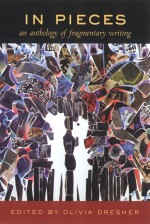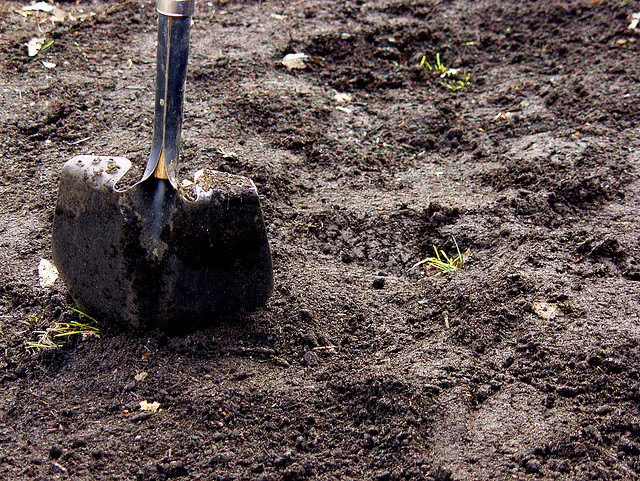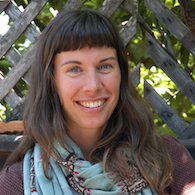Fragmentary Writing by Stacy Carlson
Excerpt from “Digging It Up”
Editor’s Note: These fragments from Stacy Carlson's writing notebook first appeared in In Pieces: An Anthology of Fragmentary Writing (Impassio Press, 2006), edited by Olivia Dresher. "The story of a writer emerging by way of a novel, her notebook—which became a work in itself—chronicles the creative process as well as daily life, travel, memory, and dream," notes Dresher.
 Carlson fills in more details in a 2010 post from her blog, explaining that the original journal entries were written “circa 1999” in Seattle:
Carlson fills in more details in a 2010 post from her blog, explaining that the original journal entries were written “circa 1999” in Seattle:
I chronicled daily life, sure, but also the process of writing my first novel, the unpublished Crescent. Everything about that book was rooted in the Northwest, my ancestral home, and for a period of four years or so I dug into that fertile soil, read oral histories, spent weeks in the Skagit Valley, where the mythical town of Crescent lay, and pioneered my way through my first book-length manuscript.
Now, we’re pleased to reprint an excerpt from Carlson's longer anthology piece (“Digging It Up: Notebook for a Novel”) in the TW Reading Series.
For more about In Pieces, see the Impassio Press website.

Dig down, now, beneath the surface into layers and layers of loam. I accept the use of metaphor as my shovel. The words are the tool, the hole deepening as I work. The extension of words from my hand and my head lowers me down. No more prologue. I’m scared. I face the same old hyena in my mind, old wolf shadow: you’re weak, empty, delusional, small in heart. I feel more acutely than ever I’m not dedicating my life fully to art. To these scrawls. To this deepening chasm. All my people, the people of Crescent, are hanging in suspended animation, arm in arm and cheek to cheek, frozen in their dance.
• • •
Remembering that day in the Alcazar, I leaned over the railing of a green fishpond and a koi kissed the end of my finger. That night, drinking apple wine with Kate, Antonio the innkeeper spoke to us, and I translated. I was proud, sitting there, translating for the other girls, so they could hear his words about us all being children of the earth, and how he was the angel (no matter how heavy and drunk and how patched his shoes) who hung suspended outside our windows and wished us good night.
• • •
I must go to the cemetery and flood myself with names.
• • •
I have a vision of all the former inhabitants of a house sitting on the porch just before sunrise. They are ghosts in a foggy morning, drinking lemonade out of elegant glasses. They disappear as dawn lightens. They are sad to go; they miss life. They share the history of the house.
• • •
Cling to the filament of possibility. Let the characters wander off in my brainstorm. Try to dream about it or speculate on the dream that might be: Isaac drives the truck straight out of town for eight hours straight. He gets way up into British Columbia, in the forest, on the coast. He sits and drinks the strongest coffee ever and contemplates his life. He eventually decides to come home again. When he walks in the door, he looks at his wife and sees her for the first time.
• • •
I know about the world from reading and hanging around in junk stores.
• • •
I visited Grandma on Saturday. She’s convinced she owns the whole nursing home. “It’s so strange how your life turns out,” she told me, shaking her head. “You start out a poor little girl on a wheat farm, and you end up a millionaire.” She was confused by all the other tottering folks around. “Who in the world is that?” There is a curious sisterhood there—many more women than men, many of them carrying their purses around uselessly.
• • •
Golden October roses and water like mercury under the Ballard Bridge as I drove home from work. Once again, the inexplicable excitement of autumn brushes against me. Burrowing in sweaters and soft scarves. I want heavy rain and hot coffee to cut the bite in the air.
• • •
I need a kick-start, jump-start, roll-start, some spark. I feel like I’m walking on tundra: The ground cover is interesting and intricate, but it’s not the ground. I can’t feel the story under my feet. But such legends of my homeland I’m reading: albino spirit bulls diving soundlessly into lakes and stories of unearthly children clinging to the barnacled back of an unnamable monster. Ghoul John the grave robber, snatching up the lids of burial canoes and snaking off with the skulls. The tales are short and choppy, and I grow restless. An elk running off with a maiden, a murdered woman turned to soap at the bottom of a glacier-cold lake. Drowning, drowning.
• • •
Standing with my father in the open-air passage between train cars. Our train slowed, and another train, going the opposite direction, passed. Our conductor leaned out his window to give the other conductor today’s newspaper. A Dutch man sharing our window tells me I have many fathers on this trip, and we laugh, my own dad next to me, laughing on a train in Mexico.
• • •
Crescent is a book about the fragmented ways our inheritance reaches us.
The way patterns of family silence keep us in tension.
How half-heard stories give us refuge.
• • •
The fernery: gigantic fiddleheads, the tightly coiled journey. Fruit bats hang above like heavy black droplets, Job’s tears indeed. Already I feel a certain androgyny in solitude. I caught my reflection today in a dark artwork in the museum and gasped that I’m a woman. Veils of isolation are welcome, really. The monologue in my brain has no gender to me, so seeing my image is like seeing a stranger. I’ll let ambiguity have its way with me for now.
• • •
Will my journal take a turn for the visual if I don’t replace the camera I just broke?
• • •
Yesterday, the cowboy asked me, “What do you do?” Since I’m out of a real job and I’m in Australia, I said, “I’m a writer.” He said, “Are you any good?” I said something like, “Well, I’m always learning. I’m a lot better than I used to be.” He leaned down to me, in his hat and boots and good jeans, and said, “When people ask you that, you know what you have to say?”
“What?”
“Say, Shit yeah, I’m good.”
He’s right, of course.
Art Information
- "Tricycle Gardens" © Maggie McCain; Creative Commons license.
 Stacy Carlson is the author of the novel Among the Wonderful (Steerforth, 2012). Her work has also appeared in Tin House, Post Road, Inkwell, Sparkle+Blink, and elsewhere. She is the recipient of fellowships from Djerassi Resident Artists Program, Signal Fire, and The Arctic Circle. She received the 2003 Dana Portfolio Award, given for three book-length manuscripts.
Stacy Carlson is the author of the novel Among the Wonderful (Steerforth, 2012). Her work has also appeared in Tin House, Post Road, Inkwell, Sparkle+Blink, and elsewhere. She is the recipient of fellowships from Djerassi Resident Artists Program, Signal Fire, and The Arctic Circle. She received the 2003 Dana Portfolio Award, given for three book-length manuscripts.
Stacy grew up in Seattle and now lives in Oakland, California. Her background includes work as a historical ecologist, in a fish cannery, as a hot springs caretaker, with a field crew on a bird refuge in southeast Alaska, and as a wilderness guide in Big Sur. She was only 23 miles from Mount St. Helens when it erupted in 1980, and she credits that experience, as well as a journey by kayak on the Yukon River when she was ten, as the reasons she became a writer.
For more about “Digging It Up: Notebook for a Novel,” see Stacy Carlson's blog post about it (November 28, 2010).
